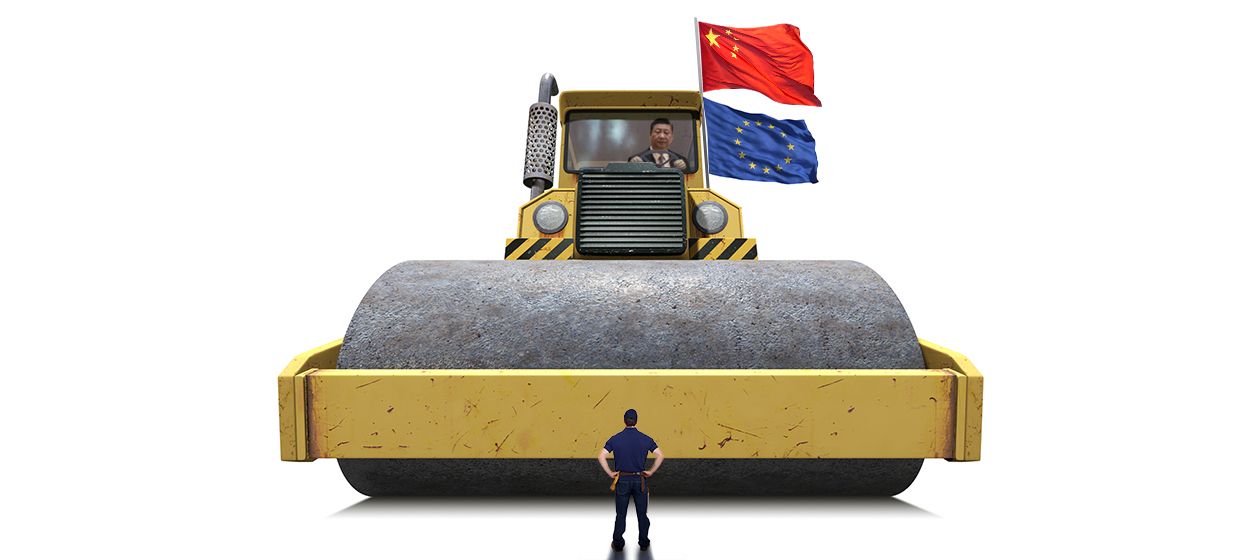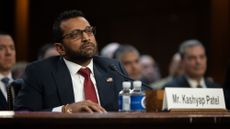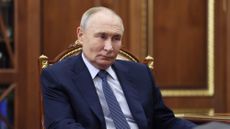Why Western workers would get rolled by a China-EU trade alliance
The biggest loser isn't Trump


President Trump has no interest in maintaining the global trade order. But lately, it looks like China and the European Union might just join forces to do it themselves.
To critics of how Trump is destabilizing international relations, this might seem like a good idea: The other adults in the room are stepping up. But for all his bluster and negligence, Trump is not wrong on the big picture point that the global trade status quo is badly dysfunctional.
Should it come to pass, a China-EU partnership would likely either ignore or exacerbate those problems.
Subscribe to The Week
Escape your echo chamber. Get the facts behind the news, plus analysis from multiple perspectives.

Sign up for The Week's Free Newsletters
From our morning news briefing to a weekly Good News Newsletter, get the best of The Week delivered directly to your inbox.
From our morning news briefing to a weekly Good News Newsletter, get the best of The Week delivered directly to your inbox.
Granted, when it comes to trade (and a whole lot else), China and the European Union still have a lot of mutual distrust and grievances. But now Trump is slapping tariffs on both parties and even calling the EU a "foe" on trade. He's also made clear he'd like to dynamite the status quo of large multilateral trade deals, and go back to doing American trade policy one-on-one with other countries. All that is inevitably leading China and Europe to look to one another as potential partners as the United States goes it alone.
The trend became increasingly apparent this month, as Chinese officials met with German officials, and then with European Union officials just a few days ago. "Since relations with the U.S. are becoming increasingly difficult, the other economic giant, China, is inevitably becoming more important to us," said Volker Treier, a trade expert with Germany's Chambers of Commerce Federation. Hua Chunying, China's Foreign Ministry spokeswoman, was even more blunt: "Initiating a trade war for selfish interests is typical unilateralism and zero-sum game mindset. It is a retreat from the international rules and global governance since the Second World War."
Neither China nor the EU is advocating stasis, at least in their rhetoric.
China has long placed significant restrictions on foreign investment within its borders. Its rules also force foreign companies in China to partner with Chinese firms, which are often state-owned. Inevitably, these partnerships involve sharing technology and trade secrets — fueling legitimate complaints that China is essentially forcing the transfer of intellectual property.
Now, China is suggesting it will ease up on those regulations and significantly improve market access. In the mid-July meeting, both sides agreed they'd like a revamp of World Trade Organization (WTO) rules that would better equip the organization to deal with these sorts of disputes. And at the start of the month, Germany and China signed a flurry of agreements for various business dealings, even as German companies move to expand within China.
"We feel it is necessary to improve and reform the WTO," Chinese Premier Li Keqiang said recently.
Reform, in other words, is in the air. What's the problem?
Let's start with the increased market access to China and the forced technology transfers. More freedom to invest in China will certainly help out wealthy Western investors. But it does little good for the broad sweep of workers across Europe. (Or America.)
The same goes for forcing China to abide by intellectual property laws. There's certainly a baseline need for players in an agreement to respect the agreement's rules. But in this case the rules are bad. The intellectual property laws China violates serve to drive up the costs of critical medicines and drugs in particular. Nor is bringing in large IP licensing fees a labor-intensive industry, exactly. Should China actually start paying such fees, as the EU would like, the money would end up mostly in the pockets of wealthy shareholders of Western corporations.
Indeed, the biggest single problem with China's trade policy is the value of its currency, which remains quite low. That makes Chinese exports cheaper and has gone a long way towards gutting blue-collar industries in America and Europe. Nothing in the talks between China and the EU suggests an effort to confront that issue. They're discussing changing some tariffs, and perhaps doing more to curb Chinese dumping of ultra-cheap steel on the global market. But nothing systemic.
Even the European Union's internal policies reflect this blind spot. Whatever its accomplishments on the jobs front, Germany has actually clamped down on its workers' pay for years. This was meant to keep prices down, and to preserve Germany's trade surplus even as it balanced its national budget. It also meant Germany's trading partners in Europe might be forced into corresponding trade deficits, but thanks to the tight money eurozone policies that Germany strenuously enforces, these countries weren't allowed to correct their trade imbalances with budget deficits.
Thus eurozone elites get deregulation and balanced budgets, while workers in countries like Germany get stagnation and those in countries like Greece get permanent depressions. Meanwhile, Germany runs relatively low trade deficits with China specifically, so it has little to complain about regarding the latter's currency policy.
Trump often treats global trade as a conflict between nations. But it's better understood as a conflict between global classes. The modern global trade order has richly rewarded elites in America, European Union, and China alike, while undercutting the working classes in the U.S. and Europe. Nor does the argument that this all had to be done to lift up the relatively poorer working classes in China and elsewhere hold any water.
Trump, in his own confused, contradictory, destructive way, was a reaction against this. Now the elites around the world that benefit from the status quo feel threatened and are moving to contain him. But the "reform" being contemplated by China and the EU looks like it will leave all the problems that gave rise to Trump in place.
Or even make them worse.
Sign up for Today's Best Articles in your inbox
A free daily email with the biggest news stories of the day – and the best features from TheWeek.com
Jeff Spross was the economics and business correspondent at TheWeek.com. He was previously a reporter at ThinkProgress.
-
 Why some people remember dreams and others don't
Why some people remember dreams and others don'tUnder The Radar Age, attitude and weather all play a part in dream recall
By Chas Newkey-Burden, The Week UK Published
-
 The Week contest: Hotel seal
The Week contest: Hotel sealPuzzles and Quizzes
By The Week US Published
-
 New FBI Director Kash Patel could profit heavily from foreign interests
New FBI Director Kash Patel could profit heavily from foreign interestsThe Explainer Patel holds more than $1 million in Chinese fashion company Shein
By Justin Klawans, The Week US Published
-
 Who is the Hat Man? 'Shadow people' and sleep paralysis
Who is the Hat Man? 'Shadow people' and sleep paralysisIn Depth 'Sleep demons' have plagued our dreams throughout the centuries, but the explanation could be medical
By The Week Staff Published
-
 Why Assad fell so fast
Why Assad fell so fastThe Explainer The newly liberated Syria is in an incredibly precarious position, but it's too soon to succumb to defeatist gloom
By The Week UK Published
-
 Romania's election rerun
Romania's election rerunThe Explainer Shock result of presidential election has been annulled following allegations of Russian interference
By Sorcha Bradley, The Week UK Published
-
 Russia's shadow war in Europe
Russia's shadow war in EuropeTalking Point Steering clear of open conflict, Moscow is slowly ratcheting up the pressure on Nato rivals to see what it can get away with.
By The Week UK Published
-
 Cutting cables: the war being waged under the sea
Cutting cables: the war being waged under the seaIn the Spotlight Two undersea cables were cut in the Baltic sea, sparking concern for the global network
By The Week UK Published
-
 The nuclear threat: is Vladimir Putin bluffing?
The nuclear threat: is Vladimir Putin bluffing?Talking Point Kremlin's newest ballistic missile has some worried for Nato nations
By The Week UK Published
-
 Russia vows retaliation for Ukrainian missile strikes
Russia vows retaliation for Ukrainian missile strikesSpeed Read Ukraine's forces have been using U.S.-supplied, long-range ATCMS missiles to hit Russia
By Arion McNicoll, The Week UK Published
-
 Has the Taliban banned women from speaking?
Has the Taliban banned women from speaking?Today's Big Question 'Rambling' message about 'bizarre' restriction joins series of recent decrees that amount to silencing of Afghanistan's women
By Harriet Marsden, The Week UK Published